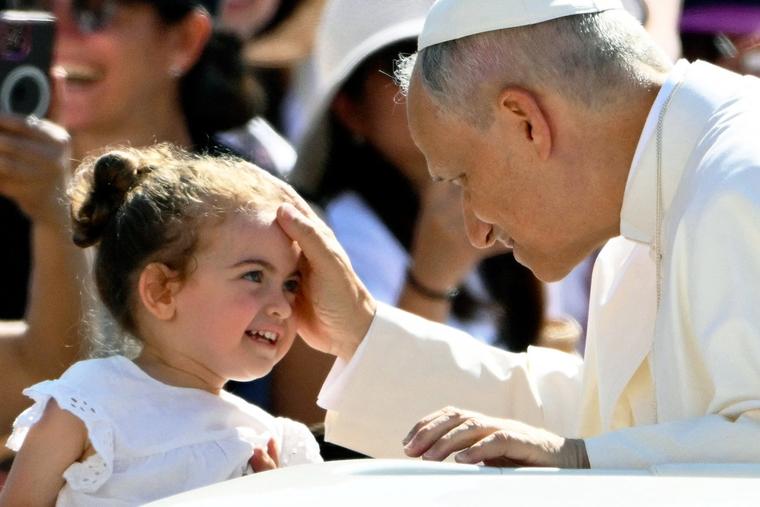COMMENTARY: The blessings of true fatherhood flow from God — and vanish when we reject his authority and turn power against ourselves.
On Father’s Day, June 15, an estimated 5 million Americans engaged in a “No Kings” protest. “King” symbolizes the type of authority that is incompatible with democracy.
In philosophical terms, the protest was about what was perceived to be authoritarianism on the part of the president. At the same time, the protest was vulnerable to the criticism that the protesters wanted to seize the reins of authority that they denounced in the president.
Coinciding with the massive protest was a comparably massive military parade honoring the 250th anniversary of the U.S. Army. It was a Father’s Day that brought into sharp focus democracy, authority, authoritarianism, militarism and fatherhood.
The problem of justifying authority in a democracy, which presumes equality between the people, is a subject of ongoing discussion. How can one person or a group of persons rise above the masses and demand their obedience? How can there be a genuine right to be obeyed?
In his book Scholasticism and Politics, Jacques Maritain argues that “the means of authority, however vigorous the latter may be, must be to look after the realization of freedom and friendship, rather than after the fulfillment of discipline of a military type.” The combination of freedom and friendship is, indeed, a lofty goal, but it’s exceedingly difficult to realize.
All authority is derived from God as from its primordial source. Hence, the practice of assuming a position of political authority by swearing on the Bible. “So help me, God” expresses our reliance on God when we have doubts about ourselves. When we pray, we pray to “Our Father.”
The fact that God is the author of creation invests him with rightful authority. God the Father harmonizes authority with love. He does not use his authority in a tyrannical way. Nonetheless, perhaps the most momentous decision in the annals of human history is the assumption that God uses his authority to prevent man from being free. Adam and Eve’s original sin was to assume wrongly that God’s authority is incompatible with their freedom.
In his international best-selling book Crossing the Threshold of Hope, Pope St. John Paul II states, “Original sin is not only the violation of a positive command of God but also, and above all, a violation of the will of God as expressed in that command. Original sin attempts, then, to abolish fatherhood, destroying its rays which permeate the created world, placing in doubt the truth about God who is Love and leaving man only with a sense of the master/slave relationship.”
The great delusion is that God uses his authority to imprison us.
The tragedy of man, in rejecting the legitimate authority of God the Father, is that he uses his own authority against himself. In rejecting God’s authority, he finds not emancipation, but enslavement. As Henri De Lubac states in his book, The Drama of Atheist Humanism, “Man cannot organize the world for himself without God; without God he can only organize the world against man. Exclusive humanism is inhuman humanism.”
In Deuteronomy 32:6, God rebukes Israel, saying, “Is this the way you repay the Lord, you foolish and unwise people? Is he not your Father, your Creator, who made you and formed you?”
To rebel against God the Father is to rebel against oneself. The fatherhood of God provides leadership, direction and freedom in the proper sense.
America is currently experiencing a crisis concerning its lack of respect for the important place of the father. Sociologist David Blankenhorn, in his book, Fatherless America: Confronting Our Most Urgent Problem (Basic Books), provides evidence that fatherlessness is the leading cause of the declining well-being of children and the engine that drives our most urgent social problems, from crime to adolescent pregnancy to child sexual abuse to domestic violence against women.
It is to America’s great misfortune that although some academics recognize the problem, other academics are denigrating fatherhood while misunderstanding its legitimate role.
In a 1999 article published in the American Psychologist, authors Louise Silverstein and Carl Auerbach argue that fathers are not essential to the well-being of children. In fact, they believe it is positively dangerous to think otherwise: “We see the argument that fathers are essential as an attempt to reinstate male dominance by restoring the dominance of the traditional nuclear family with its contrasting masculine and feminine gender roles.”
Such academics see the worm in the apple (fathers have not always been true to their office), but lose sight of the apple.
When the fatherhood of man is centered on the fatherhood of God, it becomes apparent that fatherhood is always accompanied by love, protection, guidance, mercy and assistance in the development of moral character. Being freed from the “fetters” of fatherhood means that we neither know who we are nor where we are going. Fatherhood gives us both our identity as well as our destiny.
Harper Lee (1926-2016) is best known for her Pulitzer Prize-winning novel, To Kill a Mockingbird. She penned a tribute to fatherhood that deserves the same recognition as her famous book. It speaks to the indispensable love and guidance that is proper for a father to provide:
She did not stand alone, but what stood behind her,
the most potent moral force in her life,
was the love of her father.
